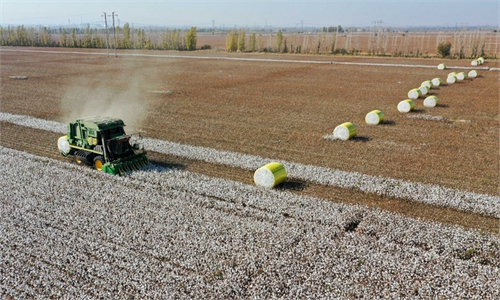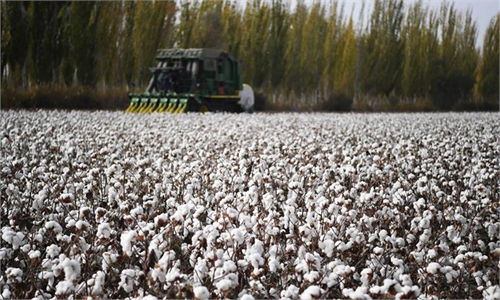Chinese business community slams US ban on Xinjiang products
Industry groups call for efforts to bolster competitiveness

Xinjiang cotton Photo: VCG
Several Chinese business organizations have condemned a latest US move that blocks the imports of products and raw materials from Northwest China's Xinjiang Uygur Autonomous Region, while calling for efforts to bolster the domestic industries and advance in global supply chains.
The China Enterprise Confederation, China Cotton Association, the China National Textile & Apparel Council, China Nonwovens & Industrial Textiles Association and other business associations all issued solemn statements on Saturday, firmly opposing the hegemonic act of the US that unilaterally block Xinjiang products from entering the international supply chain through its domestic legislation and administrative measures.
"Chinese companies definitely against US hegemony. But what matters most is how they respond to the block. What China needs is the establishment of a complete supply chain and brand building, which cannot be accomplished by one company. It requires the whole industry chain to work together," an independent analyst surnamed Zhou told the Global Times on Sunday.
Zhou said that targeting Xinjiang is another card that the US will play for a long time, as the effect of the US' attempt to play the "Taiwan card" and impose tariffs on Chinese products fades.
Zhang Xiaorong, director of the Beijing-based Cutting-Edge Technology Research Institute, added that the US' strategy on China has changed to one of smearing China, deliberately disgusting people and stirring up trouble everywhere.
"The US has vowed to isolate China diplomatically, undermine China's relations with other countries, and put China in a state of unpreparedness so that it can take advantage of chaos," Zhang told the Global Times on Sunday.
Zhang said that the US targeted the products from Xinjiang because US officials think they can find alternatives.
The Chinese business associations said that the US has set a bad and dangerous precedent in the field of international economic and trade rules to serve its geopolitical goals.
"Central Asia is an important channel for China-Europe trade, especially the China-Europe freight train link and the Belt and Road Initiative, of which Xinjiang is the bridgehead. That's also why the US does not want to see stable development in Xinjiang," Zhou said.
Analysts said that China's cotton and other industries need to take actions to improve their international pricing power.
"China is a big producer and importer of cotton, but it has no global pricing power. This is one of the key areas that need a breakthrough. The industrial revolution began with the textile industry. Clothing, which needs cotton, and transportation are the most globalized industries and crucial to consumption," said Zhou.
The China Enterprise Confederation also said that the US severely undermines the basic human rights of people of all ethnic groups in Xinjiang, such as their rights to subsistence and development, and will jeopardize the stability of global supply and industry chains as well as the interests of relevant enterprises and the global economic recovery from the epidemic.
Xinjiang cotton accounts for nearly 90 percent of China's cotton output with the region's total cotton output and planting area ranking first in China for more than 20 consecutive years, according to statistics from the National Bureau of Statistics (NBS).
Output of cotton in Xinjiang jumped from 25,100 tons in 1955 to 5.129 million tons in 2021, which is a solid foundation for China's textile industry.
In 2021, cash income per mu (0.06 hectare) of cotton increased by 1,334.11 yuan ($209.5) compared with 2020, an increase of 160.63 percent, according to the Xinjiang Development and Reform Commission.


